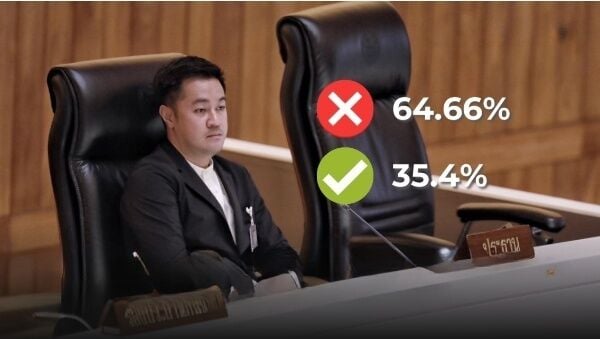Bill leaves bad poll taste: Over 60% oppose controversial amnesty bill

An online poll revealed that more than 60% of respondents are against a contentious draft amnesty bill, proposed by Poonsuk Poonsukcharoen of Thai Lawyers for Human Rights and seconded by a staggering 36,723 people. The bill, currently under parliamentary consideration, sparked a fierce public debate.
Conducted between May 13 and June 12 in accordance with Article 77 of the Constitution, the survey drew opinions from 90,503 participants. A significant 64.66% opposed the draft, while only 35.4% were in favour. The bill aims to grant amnesty for various offences committed since the coup of September 19, 2006. This includes charges of lèse majesté, civilians tried by military courts, and violations of the State of Emergency and the referendum act endorsing the 2016 charter.
Deputy House Speaker Padipat Suntiphada, responding to the poll results on his X post, formerly Twitter, expressed concerns about the poll’s integrity and instructed parliamentary officials to investigate. Padipat, formerly of the Move Forward Party (MFP), was expelled in a strategic move to maintain the deputy House speakership within the party’s influence, albeit under a different banner.
Interestingly, the MFP proposed its amnesty bill on October 6 last year. This bill sought to pardon all political offenders involved in protests since 2006, excluding state officials involved in the crackdowns. It also included provisions to pardon those charged with lèse majesté.
Adding to the controversy, the Pheu Thai party is crafting its version of an amnesty bill. Critics argue that this bill primarily aims to protect paroled former Prime Minister Thaksin Shinawatra from lèse majesté prosecution, reported Thai PBS World.
ORIGINAL STORY: Pheu Thai rethinks lese majeste inclusion in amnesty bill
Pheu Thai Party has reconsidered its earlier statement regarding the inclusion of Section 112, or the lese majeste law, in the amnesty bill.
Deputy Prime Minister and Commerce Minister Phumtham Wechayachai stated that the matter is complex and requires public consensus to prevent future disorder.
Phumtham, the deputy leader of Pheu Thai, mentioned that the party has not reached a final decision on whether to support the proposal to include Section 112 in the bill.
Somkid Chueakong, a spokesperson for the House committee studying amnesty for political prisoners and deputy secretary-general for political affairs to Prime Minister Srettha Thavisin, stated this week that numerous committee members favour the inclusion of Section 112 offences in the bill. He emphasised that Pheu Thai never opposed the idea of including Section 112 offences in the amnesty bill.
Phumtham highlighted that the party aims to consider the people’s needs. If all concerned parties agree to grant amnesty to those who violated Section 112, it would simplify the process, and the party would proceed in that direction.
Upon being questioned about the criticism that the amendment might benefit former Prime Minister Thaksin Shinawatra, recently indicted on a lese majeste offence, Phumtham dismissed the criticism, stating that he does not focus on such claims.
“Today, we do not object to or deny the proposal. I believe that society understands this matter’s political and social impacts. The government is striving to choose the best path that will not lead to conflict.”
Thaksin’s indictment
On May 29, the attorney general announced Thaksin’s indictment on this and other computer crime violations stemming from an interview he gave to a newspaper in Seoul on February 21, 2015.
Thaksin has been ordered to appear at the Office of the Attorney General on June 18, after postponing due to a Covid-19 infection on May 29. While Thaksin has not appeared before the media since that day, he was seen visiting a spa shop in the Phloenchit area of Pathumwan district on Wednesday, reported Bangkok Post.
In a related development, Nanthiwat Samart, former deputy director of the National Intelligence Agency, took to Facebook to caution that the move mirrors events leading up to the coup d’etat of May 2014.
Nanthiwat recalled that the Yingluck administration attempted to pass a blanket political amnesty bill in 2013, which was suspected of being a means to absolve Thaksin, who was in self-exile at the time. The bill sparked massive protests led by the People’s Democratic Reform Committee, ultimately leading to the ousting of the Pheu Thai-led administration.
Latest Thailand News
Follow The Thaiger on Google News:


























